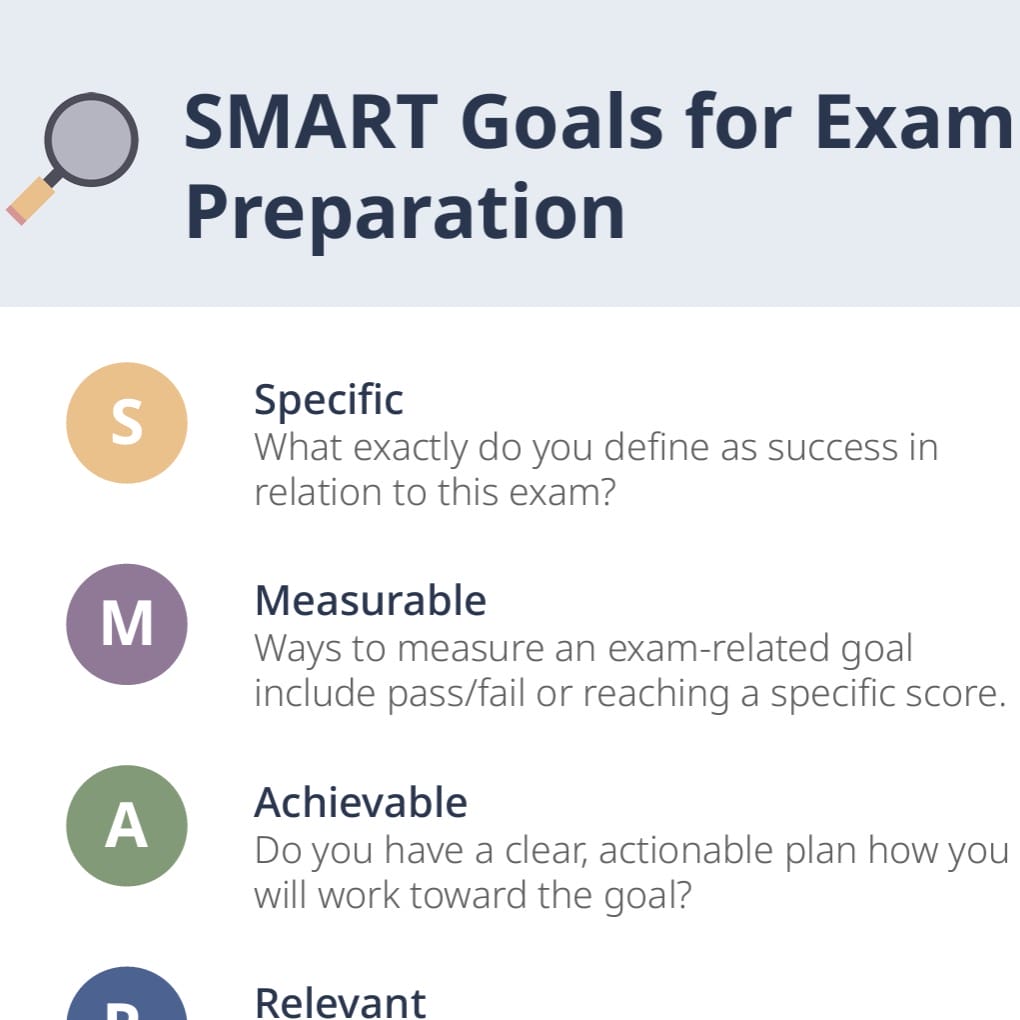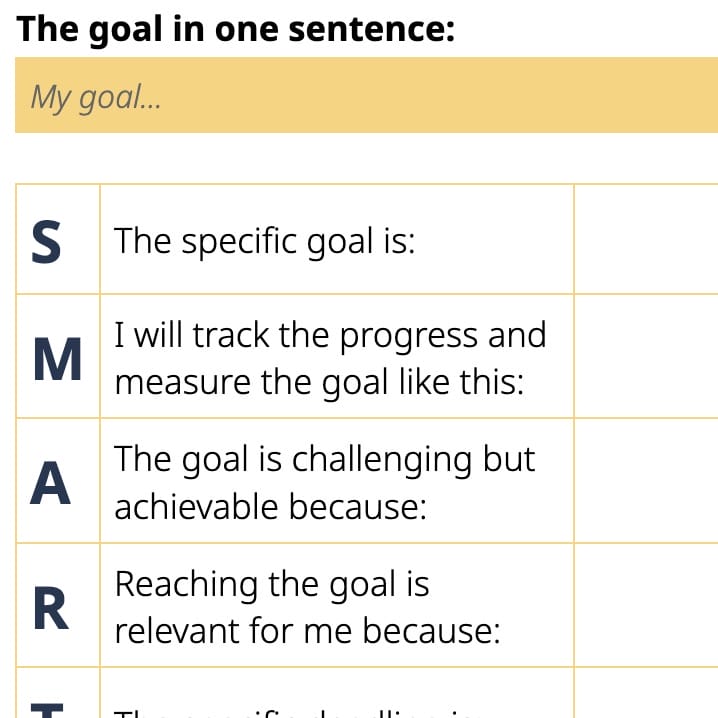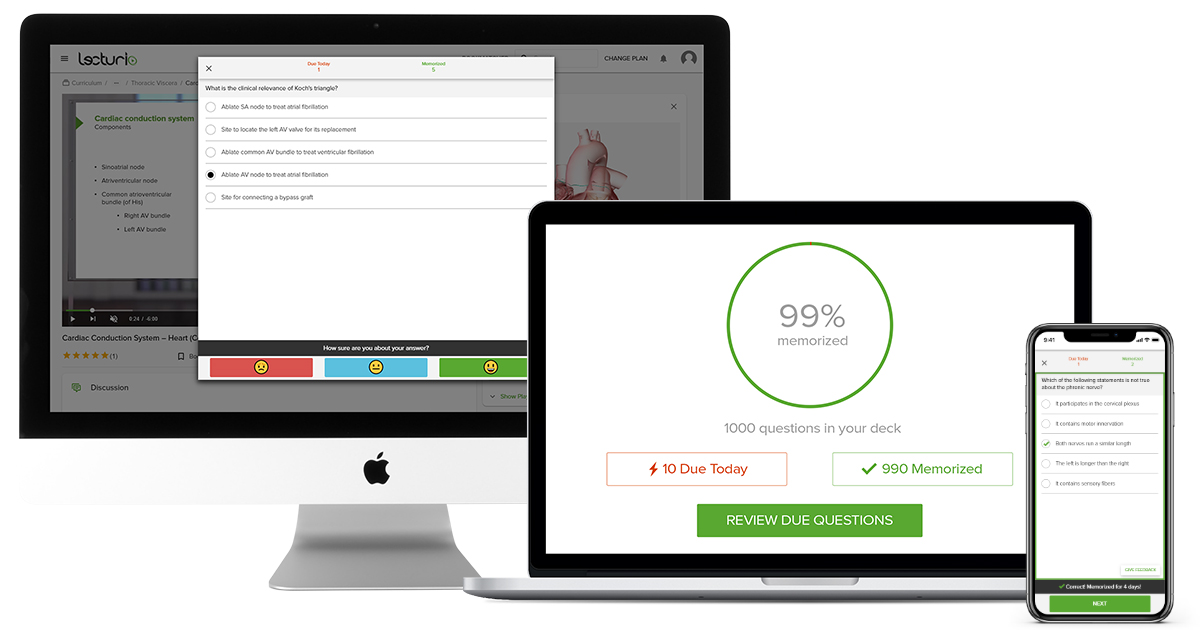Introduction
Getting through higher education is a huge goal in itself, and it’s broken up into many smaller goals: Get through the semester, pass this class, pass this exam, master a specific topic, and so on.
Learning how to set goals properly can help you feel less overwhelmed. Always knowing what you are currently working towards, and how this contributes to your overall goal of becoming a healthcare professional, helps with motivation by keeping your eyes on the prize and keeps you organized.
The best way of doing this is by setting SMART goals.
Free resources on this post:
- PDF on how to create SMART goals for exam preparation
- Google document template for creating your own SMART study goals
What is a SMART Goal?
SMART goals are goals that meet certain criteria; namely that they must be:
- S: Specific.
- M: Measurable.
- A: Achievable.
- R: Relevant.
- T: Time-bound.
The concept of SMART goals is believed to come from George T. Doran, who published a paper in 1981 titled “There’s a S.M.A.R.T. way to write management’s goals and objectives.” It discussed how difficult it is to set goals in a way that is actually helpful for productivity. The concept has since been adapted to a wide variety of fields outside of management. Doctors and nurses set SMART goals to further their clinical practice and career. SMART goals for students involve setting goals that help you achieve academic success effectively throughout your studies.
How SMART Goals Work
How the SMART criteria help you define productive goals
The process of setting SMART goals begins by evaluating what you want to achieve and then detailing the specifics using the SMART framework as a guide. Here’s how each component contributes to a well-defined goal:
- Specific ensures the goal is clear and unambiguous. A nonspecific goal is difficult to achieve – how would you work toward achieving something only vaguely defined? How would you know you have achieved it?
- Measurable provides a way to assess progress, which can help maintain motivation and adjust the approach if needed. If you have no way of measuring your goal, how would you know how close you are to achieving it?
- Achievable confirms that the goal can realistically be accomplished, which helps in planning effectively and allocating the necessary resources. It is hard to keep up motivation and to actively pursue your goal when you can’t even be sure it is possible and might be wasting your time!
- Relevant guarantees that the goal aligns with larger objectives. Knowing how this little goal in front of you contributes to you getting your dream job in the future is important context.
- Time-bound gives a deadline that commits you to a timeline. This is essential for effective prioritization and motivation. If you don’t have a timeline, your goal could be procrastinated indefinitely, keeping you from using your time effectively and working productively.
Example of a general goal vs. a SMART goal
A general goal might be: “I need to improve at pharmacology.” What exactly does that mean? How would you know you got better? What exactly do you need to do, and when? It is a goal that does not help you with any concrete steps and is difficult to work with. Let’s turn this into a SMART goal:
“My goal is to pass my pharmacology final exam with a 90% score in three months by studying four times a week with flashcards and questions, and completing two full practice exams each month.”
Following this framework and defining your goals with these criteria in mind makes sure that you are working towards goals that are useful and trackable for you.
The Benefits of SMART Goals
SMART goals make it easier to break down larger objectives (like passing a class) into achievable, incremental steps (like following a study plan that directly leads to passing an exam), making it easier to monitor progress and make adjustments along the way.
Here’s how they help:
- Clear, achievable goals immediately create motivation and provide continuous feedback about the progress.
- The clear time frame encourages efficient time management of your schedule to meet deadlines.
- Specific and realistic goals with measurable outcomes tend to have higher success rates because they require detailed planning and commitment.
Especially as a student in healthcare, you deal with vast amounts of study materials. SMART goals allow you to focus on one aspect of your studies at a time, reducing overwhelm and increasing your learning efficacy.
Where and How to Set SMART Goals
SMART goals can be set at any scope or timeframe – daily, weekly, monthly, or with an even bigger scope. The principle can be applied to almost all contexts in which you want to achieve something that you need to work towards.
Another important aspect is to review and adjust your goals regularly: Monitor your progress and adjust the goal or your methods to reach it if you find you are not on track. You can set specific time intervals at which you sit down and take stock of your goals: Which one did you reach and not reach in the past week or month? What do you need to do to make sure you reach the upcoming ones successfully? Do you need to adjust anything about your schedule or priorities?
Digital tools or apps can help with organizing your SMART goals and monitoring them, for example:
- Memtime for automatic computer activity tracking that allows you to identify the exact times spent on tasks like research
- Trello for organizing tasks on Kanban boards, which makes it easier to have a good overview of your progress
- Asana, another powerful task management tool offering robust features
- Google Calendar – simple, free, and effective tool for scheduling and managing your time
- For medical and nursing school studies, the Lecturio platform does this tracking for you and constantly monitors your progress toward your goal.
Applying SMART Goals to Studying: Templates & Examples
Breaking down study demands into SMART goals
Especially in medical and nursing school, it can seem like the goal of studying is to simply “KNOW EVERYTHING.” This is not something anyone would feel optimistic working towards, so break it down into smaller, less vague or all-encompassing steps: passing exams, mastering topics, learning skills like patient assessment. Those are specific goals.
Make sure you always think of how you can evaluate your progress and performance: How do you measure your goal and how close you are to reaching it? Measurements can be scoring higher on practice tests, achieving certain grades, or successfully completing an assessment without forgetting any steps.
If you find it difficult to imagine how you will achieve a goal, it is a sign you may need to break it down into more manageable steps, that means: smaller goals.
Make sure to work toward one achievable goal at a time – you can’t do it all at once and will be more successful overall if you break it up into chunks that you focus on one at a time.
Align your goals with your future career aspirations, such as specializing in a specific field of nursing. This highlights how following your goal is important and gives you security that what you are doing will bring you closer to your dreams (and what else are dreams than our biggest goals).
Lastly, set deadlines for each goal segment – this is the best way to counteract procrastination, every student’s nightmare. Be consequent with this and you will see how it ultimately relieves stress and frees up the capacity to truly focus on your studies.
How to set SMART goals for exam preparation

Free Download: How to set SMART goals for exam prep
Download the PDF and use it as a guide to create your own SMART goals.
- Specific: Instead of phrasing your goal as “study for the exam,” specify what measurable success you want to achieve. For example: “Achieve a score of 90% on the upcoming anatomy exam in three weeks.”
- Measurable: An example for measurable checkpoints (= sub-goals) to track your progress could be “Complete 50 practice questions every day.” or “By this date, reach 70% on average in practice exams.”
- Achievable: Make sure you are setting a goal you know is realistic by planning out the steps and gauging the chances of what is doable: for example, set an expectation for yourself that has room for error by allowing scores that are not 100%, which may not be realistic for all exams.
- Relevant: A student who wants to become a cardiologist will have a specific interest in doing well on cardiology exams, and put more focus and more ambitious goals on the subject.
- Time-bound: The exam date will determine the deadline of your overall goal, but make sure to set clear deadlines for the steps you need to take as well (the sub-goals). For example, “All mock exams are completed by this date, and the final review is done two days before the exam.”
Let’s look at an example of a smart goal for a med student preparing for an anatomy exam. Here’s how they might set their SMART goal:
- Specific: “I will cover all 12 chapters of the textbook and pass 3 mock Qbank exams before the exam.”
- Measurable: “I will measure my understanding of the topics by taking chapter quizzes and aiming for a 90% score on each.”
- Achievable: “I will study three chapters per week, scheduling study sessions of two hours each weekday evening and attending the study group once a week.”
- Relevant: “Passing this exam is important for my medical school success and therefore for my big goal of becoming a physician.”
- Time-bound: “The exam is in six weeks, so I will have completed all chapters and review sessions by the end of five weeks, leaving one week for intensive review and the mock exams.”
Conclusion
SMART goals are an incredibly helpful technique to master to boost your productivity, reduce overwhelm and bring organization to your studying. By defining what you want to achieve with specificity, measuring your progress, pursuing attainable goals, keeping them relevant, and setting a definite timeframe for completion, you are on the right track to become more efficient and productive.
Taking this strategic approach not only streamlines your studies, but it prepares you to tackle goals in your future career path in an organized and effective way – you will never stop goal-setting!
Start small, perhaps with a goal for an upcoming exam. The more familiar you become with the method, the more helpful and easy it becomes to expand it to more complex and long-term goals.
Copy this free Google Doc template to start defining your own SMART goals!
Free SMART study goal Google document template
Click the button to copy the template and use it to create your own SMART goals for exam preparation or study planning!





